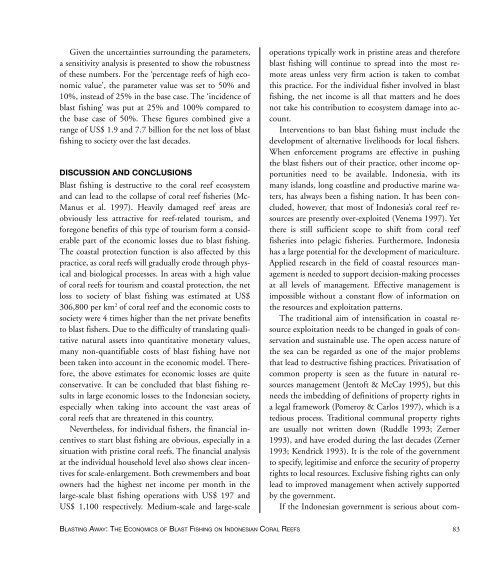You also want an ePaper? Increase the reach of your titles
YUMPU automatically turns print PDFs into web optimized ePapers that Google loves.
Given the uncertainties surrounding the parameters,<br />
a sensitivity analysis is presented to show the robustness<br />
<strong>of</strong> these numbers. For the ‘percentage reefs <strong>of</strong> high economic<br />
value’, the parameter value was set to 50% and<br />
10%, instead <strong>of</strong> 25% in the base case. The ‘incidence <strong>of</strong><br />
blast fishing’ was put at 25% and 100% compared to<br />
the base case <strong>of</strong> 50%. These figures combined give a<br />
range <strong>of</strong> US$ 1.9 and 7.7 billion for the net loss <strong>of</strong> blast<br />
fishing to society over the last decades.<br />
DISCUSSION AND CONCLUSIONS<br />
Blast fishing is destructive to the coral reef ecosystem<br />
and can lead to the collapse <strong>of</strong> coral reef fisheries (Mc-<br />
Manus et al. 1997). Heavily damaged reef areas are<br />
obviously less attractive for reef-related tourism, and<br />
foregone benefits <strong>of</strong> this type <strong>of</strong> tourism form a considerable<br />
part <strong>of</strong> the economic losses due to blast fishing.<br />
The coastal protection function is also affected by this<br />
practice, as coral reefs will gradually erode through physical<br />
and biological processes. In areas with a high value<br />
<strong>of</strong> coral reefs for tourism and coastal protection, the net<br />
loss to society <strong>of</strong> blast fishing was estimated at US$<br />
306,800 per km 2 <strong>of</strong> coral reef and the economic costs to<br />
society were 4 times higher than the net private benefits<br />
to blast fishers. Due to the difficulty <strong>of</strong> translating qualitative<br />
natural assets into quantitative monetary values,<br />
many non-quantifiable costs <strong>of</strong> blast fishing have not<br />
been taken into account in the economic model. Therefore,<br />
the above estimates for economic losses are quite<br />
conservative. It can be concluded that blast fishing results<br />
in large economic losses to the Indonesian society,<br />
especially when taking into account the vast areas <strong>of</strong><br />
coral reefs that are threatened in this country.<br />
Nevertheless, for individual fishers, the financial incentives<br />
to start blast fishing are obvious, especially in a<br />
situation with pristine coral reefs. The financial analysis<br />
at the individual household level also shows clear incentives<br />
for scale-enlargement. Both crewmembers and boat<br />
owners had the highest net income per month in the<br />
large-scale blast fishing operations with US$ 197 and<br />
US$ 1,100 respectively. Medium-scale and large-scale<br />
operations typically work in pristine areas and therefore<br />
blast fishing will continue to spread into the most remote<br />
areas unless very firm action is taken to combat<br />
this practice. For the individual fisher involved in blast<br />
fishing, the net income is all that matters and he does<br />
not take his contribution to ecosystem damage into account.<br />
Interventions to ban blast fishing must include the<br />
development <strong>of</strong> alternative livelihoods for local fishers.<br />
When enforcement programs are effective in pushing<br />
the blast fishers out <strong>of</strong> their practice, other income opportunities<br />
need to be available. Indonesia, with its<br />
many islands, long coastline and productive marine waters,<br />
has always been a fishing nation. It has been concluded,<br />
however, that most <strong>of</strong> Indonesia’s coral reef resources<br />
are presently over-exploited (Venema 1997). Yet<br />
there is still sufficient scope to shift from coral reef<br />
fisheries into pelagic fisheries. Furthermore, Indonesia<br />
has a large potential for the development <strong>of</strong> mariculture.<br />
Applied research in the field <strong>of</strong> coastal resources management<br />
is needed to support decision-making processes<br />
at all levels <strong>of</strong> management. Effective management is<br />
impossible without a constant flow <strong>of</strong> information on<br />
the resources and exploitation patterns.<br />
The traditional aim <strong>of</strong> intensification in coastal resource<br />
exploitation needs to be changed in goals <strong>of</strong> conservation<br />
and sustainable use. The open access nature <strong>of</strong><br />
the sea can be regarded as one <strong>of</strong> the major problems<br />
that lead to destructive fishing practices. Privatisation <strong>of</strong><br />
common property is seen as the future in natural resources<br />
management (Jent<strong>of</strong>t & McCay 1995), but this<br />
needs the imbedding <strong>of</strong> definitions <strong>of</strong> property rights in<br />
a legal framework (Pomeroy & Carlos 1997), which is a<br />
tedious process. Traditional communal property rights<br />
are usually not written down (Ruddle 1993; Zerner<br />
1993), and have eroded during the last decades (Zerner<br />
1993; Kendrick 1993). It is the role <strong>of</strong> the government<br />
to specify, legitimise and enforce the security <strong>of</strong> property<br />
rights to local resources. Exclusive fishing rights can only<br />
lead to improved management when actively supported<br />
by the government.<br />
If the Indonesian government is serious about com-<br />
BLASTING AWAY: THE ECONOMICS OF BLAST FISHING ON INDONESIAN CORAL REEFS<br />
83


















